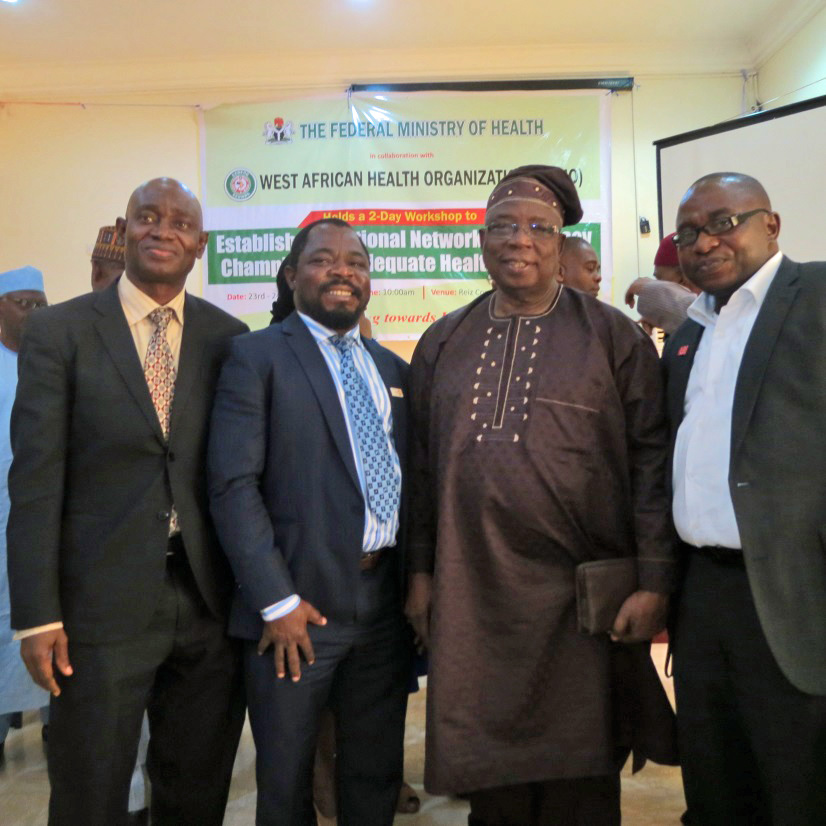Nigeria Health Financing Advocacy Network: the Case for a Political Economy Approach
Nigeria is working towards attaining universal health coverage (UHC). As the country gathers momentum for the necessary reforms, support and participation of a wide array of stakeholders including policymakers and legislators, are crucial for success.
To accelerate health financing reforms in pursuit of universal health coverage, the Federal Ministry of Health (FMoH), in collaboration with the West African Health Organization (WAHO), established a National Network of Advocacy Champions for Adequate Health Financing to contribute to better health financing. The Network will use strategic and targeted advocacy action at relevant points in the budget development process to hold Federal and State governments accountable for their financial resolutions, specifically for health. The WAHO is providing the Network with an initial US$50,000 to begin operations.
FMoH sees the important role that USAID’s Health Finance and Governance (HFG) project plays in health financing reforms at the state level. The HFG project is at the forefront of these efforts, implementing approaches that have led to successful outcomes in several states.

Left to Right: UNFPA representative, Dr. Akin Oyemakinde (Director, Department of Planning, Research and Statistics, FMoH), Prof. Eyitayo Lambo (Former Minister of Health), and Dr. Gafar Alawode (HFG Chief of Party).
The FMoH invited the HFG project to lead a discussion during the inauguration of the Network, on February 23, 2017. At the inaugural event, Dr. Gafar Alawode (HFG Nigeria Chief of Party), shared the approaches HFG has used in working with states pursuing health financing reforms, and highlighted how the team accounts for political economy. An important characteristic of HFG’s approach to its work is its recognition of the importance of political economy in Nigeria’s attainment of UHC. Multi-dimensional, multi-sectoral participation is critical for broad-based coalition building and attaining political consensus on these reforms.
In his remarks, Dr. Alawode noted that to be effective in its pursuit of UHC, Nigeria must look beyond the inefficiencies of its inherited public institutions and towards adapting public institutions to today’s contextual realities. The Government of Nigeria must also consider the states’ governance structures in the context of fiscal decentralization—which have implications for health financing decisions, as does the varying ability of states to collect revenue. It is also important to keep in mind the reality of political decentralization, which means that states are at different stages in the process of adopting major policies like the state-supported health insurance schemes and “Primary Health Care Under One Roof”.
Overcoming political economy obstacles requires a cogent analysis of theoretical policy options in light of economic realities and technical challenges, Dr. Alawode pointed out. It is critical to identify the key actors and institutions that influence political economy debates—to analyze the level of influence they have, and what their interests are. In HFG’s experience, the findings from these analyses provide critical information on who to engage with—and how to effectively negotiate with these actors and institutions to achieve UHC.
Professor Eyitayo Lambo, Nigeria’s former Minister of Health (2003─2007) emphasized that health financing would lead to economic growth in Nigeria, and said that the implementation of the National Health Financing Policy would turn the health sector into an investment hub in Nigeria.
Prof. Lambo, Dr. Shehu Sule (former Director, Department of Planning, Research and Statistics, FMoH) and Dr. Ben Anyene, (co-chair of the legislative-led Primary Health Care Revitalization Support Group and former chairman of the Health Reform Foundation of Nigeria) will lead the Advocacy Champions. Once the Network has finalized its terms of reference, statutes, and operational procedures, members will elect officers.
Dr. Akin Oyemakinde (Director, Department of Planning, Research and Statistics, FMoH), representing the Honorable Minister of Health, asked the Advocacy Champions to complement the government’s efforts towards achieving sustainable health financing of the health sector.



